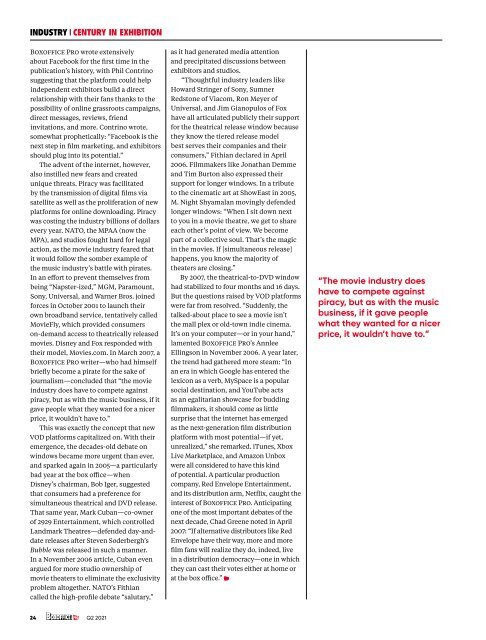Boxoffice Pro
Boxoffice Pro is the official publication of the National Association of Theatre Owners.
Boxoffice Pro is the official publication of the National Association of Theatre Owners.
You also want an ePaper? Increase the reach of your titles
YUMPU automatically turns print PDFs into web optimized ePapers that Google loves.
INDUSTRY CENTURY IN EXHIBITION<br />
<strong>Boxoffice</strong> <strong>Pro</strong> wrote extensively<br />
about Facebook for the first time in the<br />
publication’s history, with Phil Contrino<br />
suggesting that the platform could help<br />
independent exhibitors build a direct<br />
relationship with their fans thanks to the<br />
possibility of online grassroots campaigns,<br />
direct messages, reviews, friend<br />
invitations, and more. Contrino wrote,<br />
somewhat prophetically: “Facebook is the<br />
next step in film marketing, and exhibitors<br />
should plug into its potential.”<br />
The advent of the internet, however,<br />
also instilled new fears and created<br />
unique threats. Piracy was facilitated<br />
by the transmission of digital films via<br />
satellite as well as the proliferation of new<br />
platforms for online downloading. Piracy<br />
was costing the industry billions of dollars<br />
every year. NATO, the MPAA (now the<br />
MPA), and studios fought hard for legal<br />
action, as the movie industry feared that<br />
it would follow the somber example of<br />
the music industry’s battle with pirates.<br />
In an effort to prevent themselves from<br />
being “Napster-ized,” MGM, Paramount,<br />
Sony, Universal, and Warner Bros. joined<br />
forces in October 2001 to launch their<br />
own broadband service, tentatively called<br />
MovieFly, which provided consumers<br />
on-demand access to theatrically released<br />
movies. Disney and Fox responded with<br />
their model, Movies.com. In March 2007, a<br />
<strong>Boxoffice</strong> <strong>Pro</strong> writer—who had himself<br />
briefly become a pirate for the sake of<br />
journalism—concluded that “the movie<br />
industry does have to compete against<br />
piracy, but as with the music business, if it<br />
gave people what they wanted for a nicer<br />
price, it wouldn’t have to.”<br />
This was exactly the concept that new<br />
VOD platforms capitalized on. With their<br />
emergence, the decades-old debate on<br />
windows became more urgent than ever,<br />
and sparked again in 2005—a particularly<br />
bad year at the box office—when<br />
Disney’s chairman, Bob Iger, suggested<br />
that consumers had a preference for<br />
simultaneous theatrical and DVD release.<br />
That same year, Mark Cuban—co-owner<br />
of 2929 Entertainment, which controlled<br />
Landmark Theatres—defended day-anddate<br />
releases after Steven Soderbergh’s<br />
Bubble was released in such a manner.<br />
In a November 2006 article, Cuban even<br />
argued for more studio ownership of<br />
movie theaters to eliminate the exclusivity<br />
problem altogether. NATO’s Fithian<br />
called the high-profile debate “salutary,”<br />
as it had generated media attention<br />
and precipitated discussions between<br />
exhibitors and studios.<br />
“Thoughtful industry leaders like<br />
Howard Stringer of Sony, Sumner<br />
Redstone of Viacom, Ron Meyer of<br />
Universal, and Jim Gianopulos of Fox<br />
have all articulated publicly their support<br />
for the theatrical release window because<br />
they know the tiered release model<br />
best serves their companies and their<br />
consumers,” Fithian declared in April<br />
2006. Filmmakers like Jonathan Demme<br />
and Tim Burton also expressed their<br />
support for longer windows. In a tribute<br />
to the cinematic art at ShowEast in 2005,<br />
M. Night Shyamalan movingly defended<br />
longer windows: “When I sit down next<br />
to you in a movie theatre, we get to share<br />
each other’s point of view. We become<br />
part of a collective soul. That’s the magic<br />
in the movies. If [simultaneous release]<br />
happens, you know the majority of<br />
theaters are closing.”<br />
By 2007, the theatrical-to-DVD window<br />
had stabilized to four months and 16 days.<br />
But the questions raised by VOD platforms<br />
were far from resolved. “Suddenly, the<br />
talked-about place to see a movie isn’t<br />
the mall plex or old-town indie cinema.<br />
It’s on your computer—or in your hand,”<br />
lamented <strong>Boxoffice</strong> <strong>Pro</strong>’s Annlee<br />
Ellingson in November 2006. A year later,<br />
the trend had gathered more steam: “In<br />
an era in which Google has entered the<br />
lexicon as a verb, MySpace is a popular<br />
social destination, and YouTube acts<br />
as an egalitarian showcase for budding<br />
filmmakers, it should come as little<br />
surprise that the internet has emerged<br />
as the next-generation film distribution<br />
platform with most potential—if yet,<br />
unrealized,” she remarked. iTunes, Xbox<br />
Live Marketplace, and Amazon Unbox<br />
were all considered to have this kind<br />
of potential. A particular production<br />
company, Red Envelope Entertainment,<br />
and its distribution arm, Netflix, caught the<br />
interest of <strong>Boxoffice</strong> <strong>Pro</strong>. Anticipating<br />
one of the most important debates of the<br />
next decade, Chad Greene noted in April<br />
2007: “If alternative distributors like Red<br />
Envelope have their way, more and more<br />
film fans will realize they do, indeed, live<br />
in a distribution democracy—one in which<br />
they can cast their votes either at home or<br />
at the box office.”<br />
“The movie industry does<br />
have to compete against<br />
piracy, but as with the music<br />
business, if it gave people<br />
what they wanted for a nicer<br />
price, it wouldn’t have to.”<br />
24 Q2 2021

















